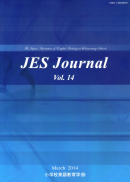Volume 14, Issue 01
PART1
Displaying 1-16 of 16 articles from this issue
- |<
- <
- 1
- >
- >|
Practical Reports
-
2014Volume 14Issue 01 Pages 4-19
Published: March 20, 2014
Released on J-STAGE: July 27, 2017
Download PDF (1022K) -
2014Volume 14Issue 01 Pages 20-35
Published: March 20, 2014
Released on J-STAGE: July 27, 2017
Download PDF (951K) -
2014Volume 14Issue 01 Pages 36-49
Published: March 20, 2014
Released on J-STAGE: July 27, 2017
Download PDF (1110K) -
2014Volume 14Issue 01 Pages 50-65
Published: March 20, 2014
Released on J-STAGE: July 27, 2017
Download PDF (1069K) -
2014Volume 14Issue 01 Pages 66-81
Published: March 20, 2014
Released on J-STAGE: July 27, 2017
Download PDF (1329K)
Research Articles
-
2014Volume 14Issue 01 Pages 84-99
Published: March 20, 2014
Released on J-STAGE: July 27, 2017
Download PDF (465K) -
2014Volume 14Issue 01 Pages 100-114
Published: March 20, 2014
Released on J-STAGE: July 27, 2017
Download PDF (1036K) -
2014Volume 14Issue 01 Pages 115-130
Published: March 20, 2014
Released on J-STAGE: July 27, 2017
Download PDF (730K) -
2014Volume 14Issue 01 Pages 131-146
Published: March 20, 2014
Released on J-STAGE: July 27, 2017
Download PDF (1085K) -
2014Volume 14Issue 01 Pages 147-162
Published: March 20, 2014
Released on J-STAGE: July 27, 2017
Download PDF (1124K) -
2014Volume 14Issue 01 Pages 163-178
Published: March 20, 2014
Released on J-STAGE: July 27, 2017
Download PDF (1187K) -
2014Volume 14Issue 01 Pages 179-194
Published: March 20, 2014
Released on J-STAGE: July 27, 2017
Download PDF (882K) -
2017Volume 14Issue 01 Pages 195-209
Published: March 20, 2017
Released on J-STAGE: July 27, 2017
Download PDF (1743K) -
2014Volume 14Issue 01 Pages 210-225
Published: April 20, 2014
Released on J-STAGE: July 27, 2017
Download PDF (2008K)
Research Projects
-
2014Volume 14Issue 01 Pages 228-243
Published: April 20, 2014
Released on J-STAGE: July 27, 2017
Download PDF (949K) -
2014Volume 14Issue 01 Pages 244-259
Published: March 20, 2014
Released on J-STAGE: July 27, 2017
Download PDF (1481K)
- |<
- <
- 1
- >
- >|
